电影刮痧 英文值日报告ppt
- 格式:ppt
- 大小:18.03 MB
- 文档页数:20
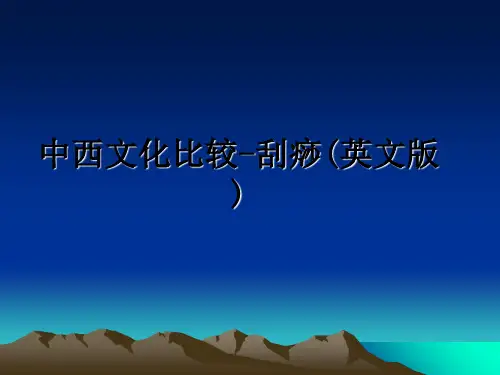
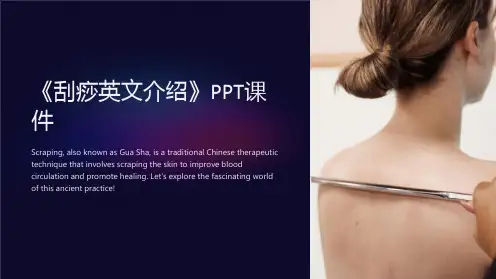
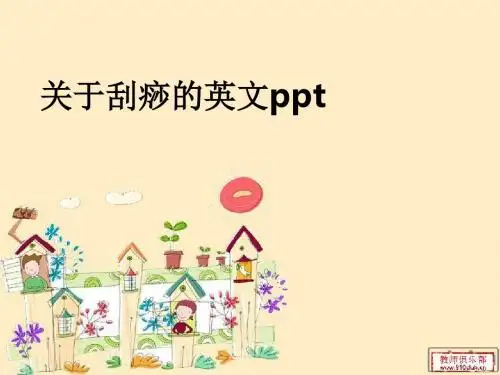
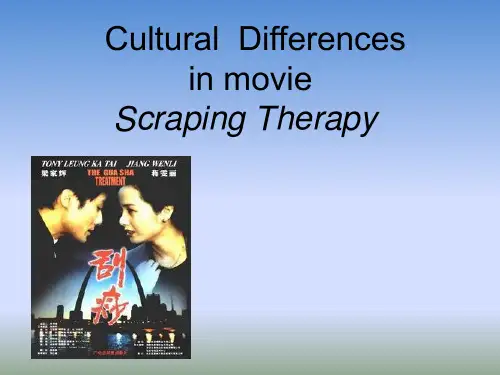
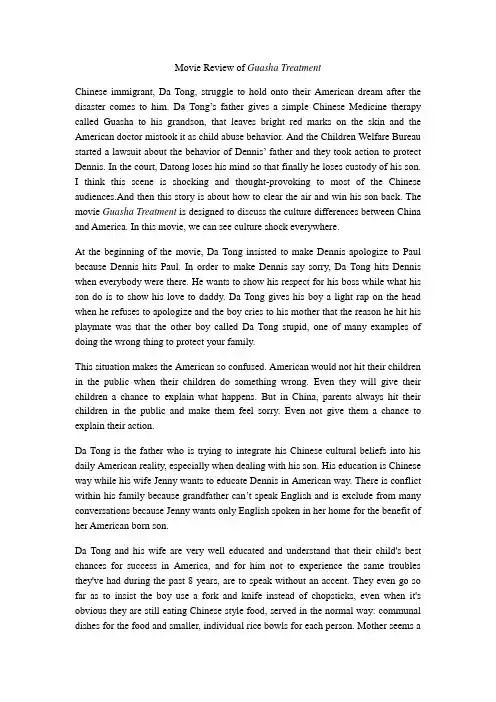
Movie Review of Guasha TreatmentChinese immigrant, Da Tong, struggle to hold onto their American dream after the disaster comes to him. Da Tong’s father gives a simple Chinese Medicine therapy called Guasha to his grandson, that leaves bright red marks on the skin and the American doctor mistook it as child abuse behavior. And the Children Welfare Bureau started a lawsuit about the behavior of Dennis’ father and they took action to protect Dennis. In the court, Datong loses his mind so that finally he loses custody of his son.I think this scene is shocking and thought-provoking to most of the Chinese audiences.And then this story is about how to clear the air and win his son back. The movie Guasha Treatment is designed to discuss the culture differences between China and America. In this movie, we can see culture shock everywhere.At the beginning of the movie, Da Tong insisted to make Dennis apologize to Paul because Dennis hits Paul. In order to make Dennis say sorry, Da Tong hits Dennis when everybody were there. He wants to show his respect for his boss while what his son do is to show his love to daddy. Da Tong gives his boy a light rap on the head when he refuses to apologize and the boy cries to his mother that the reason he hit his playmate was that the other boy called Da Tong stupid, one of many examples of doing the wrong thing to protect your family.This situation makes the American so confused. American would not hit their children in the public when their children do something wrong. Even they will give their children a chance to explain what happens. But in China, parents always hit their children in the public and make them feel sorry. Even not give them a chance to explain their action.Da Tong is the father who is trying to integrate his Chinese cultural beliefs into his daily American reality, especially when dealing with his son. His education is Chinese way while his wife Jenny wants to educate Dennis in American way. There is conflict within his family because grandfather can’t speak English and is exclude from many conversations because Jenny wants only English spoken in her home for the benefit of her American born son.Da Tong and his wife are very well educated and understand that their child's best chances for success in America, and for him not to experience the same troubles they've had during the past 8 years, are to speak without an accent. They even go so far as to insist the boy use a fork and knife instead of chopsticks, even when it's obvious they are still eating Chinese style food, served in the normal way: communal dishes for the food and smaller, individual rice bowls for each person. Mother seems abit inflexible in her insistence on being as American as possible, while Da Tong's cultural leanings are just as strongly Chinese, although not by conscious choice.The conflict arising from doing the wrong thing out of love or respect for one's family or closest friends continues throughout the movie, and every way Da Tong turns, he finds failure and encounters both obvious and subtle forms of anti-Chinese racism. Even Chinese folklore about the Monkey King (Sun Wu Kong), that Da Tong incorporates into a video game he designed is used to provoke his pride when he's vulnerable and fearing for the loss of his son. Da Tong is misunderstood by everyone, family, friend, and foe, even though he has only the best intentions, and he carries the responsibility quite heavily, making one wrong turn after another.Talking to the different cultures between the East and the West, I have to say American law does play an important role in protecting children. They have laws to force parents to take care of their children. To live their child in home alone, that is forbidden in American law while there is not such law in China. And in America, they have institutions such as Children Welfare Bureau to protect children and to deal with issues about children abuse. Well, in China we concern children not enough. Law are not comprehensive, society power is not enough too.But the most impressing scene in this movie to me is the ending. Datong wants to see his son in Christmas Eve, he has to climb a pipe to the ninth floor which his son lives.I think the pipe is not only a pipe, but also a gap, a deep gap between American and 5000-year Chinese culture. He wants to climb over the gap and he will never succeed, perhaps no Chinese people really could succeed. Person in the United States, it is very difficult to blend into local culture. This is the cultural difference between nation and nation, Chinese people would not live in their own way outside his motherland.shows how a person's cultural beliefs are so deeply set within oneself that it is usually impossible to examine why you do most anything, from how you dress and talk to whom you love and respect and how you show it. The invisible nature of one's cultural beliefs also makes it difficult to impossible to explain yourself to others when questioned.How to avoid such tragedy of this kind of story? We must enhance the culture exchange and culture study. Only with respect and knowledge to different cultures, will it be possible to accept outside culture and avoid conflict.。
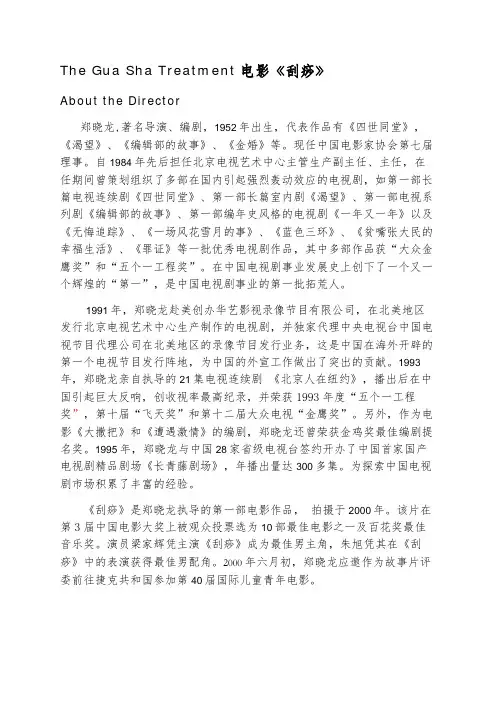
The Gua Sha Treatment 电影《刮痧》About the Director郑晓龙,著名导演、编剧,1952年出生,代表作品有《四世同堂》,《渴望》、《编辑部的故事》、《金婚》等。
现任中国电影家协会第七届理事。
自1984年先后担任北京电视艺术中心主管生产副主任、主任,在任期间曾策划组织了多部在国内引起强烈轰动效应的电视剧,如第一部长篇电视连续剧《四世同堂》、第一部长篇室内剧《渴望》、第一部电视系列剧《编辑部的故事》、第一部编年史风格的电视剧《一年又一年》以及《无悔追踪》、《一场风花雪月的事》、《蓝色三环》、《贫嘴张大民的幸福生活》、《罪证》等一批优秀电视剧作品,其中多部作品获“大众金鹰奖”和“五个一工程奖”。
在中国电视剧事业发展史上创下了一个又一个辉煌的“第一”,是中国电视剧事业的第一批拓荒人。
1991年,郑晓龙赴美创办华艺影视录像节目有限公司,在北美地区发行北京电视艺术中心生产制作的电视剧,并独家代理中央电视台中国电视节目代理公司在北美地区的录像节目发行业务,这是中国在海外开辟的第一个电视节目发行阵地,为中国的外宣工作做出了突出的贡献。
1993年,郑晓龙亲自执导的21集电视连续剧《北京人在纽约》,播出后在中国引起巨大反响,创收视率最高纪录,并荣获1993年度“五个一工程奖”,第十届“飞天奖”和第十二届大众电视“金鹰奖”。
另外,作为电影《大撒把》和《遭遇激情》的编剧,郑晓龙还曾荣获金鸡奖最佳编剧提名奖。
1995年,郑晓龙与中国28家省级电视台签约开办了中国首家国产电视剧精品剧场《长青藤剧场》,年播出量达300多集。
为探索中国电视剧市场积累了丰富的经验。
《刮痧》是郑晓龙执导的第一部电影作品,拍摄于2000年。
该片在第3届中国电影大奖上被观众投票选为10部最佳电影之一及百花奖最佳音乐奖。
演员梁家辉凭主演《刮痧》成为最佳男主角,朱旭凭其在《刮痧》中的表演获得最佳男配角。
2000年六月初,郑晓龙应邀作为故事片评委前往捷克共和国参加第40届国际儿童青年电影。
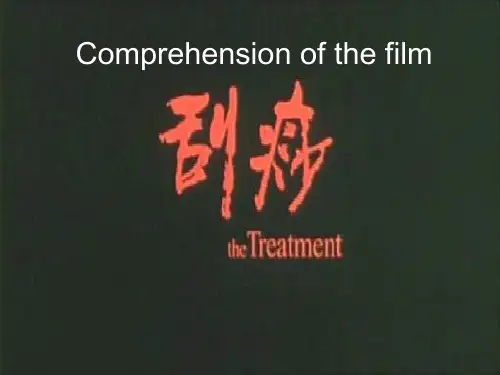


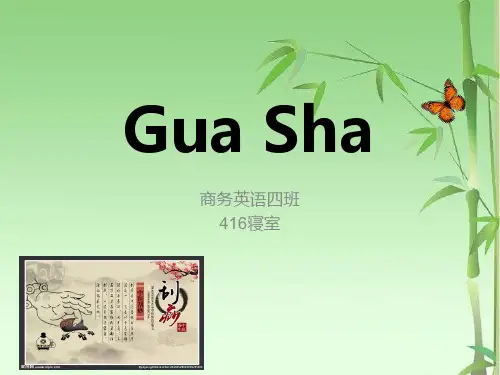
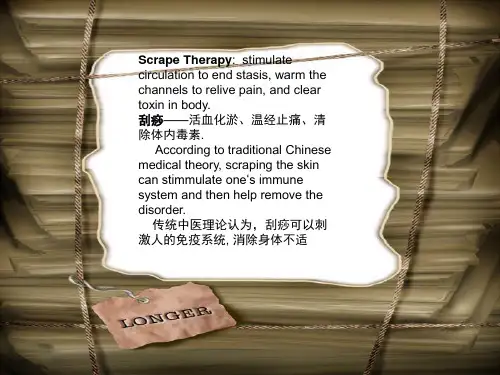
Gua ShaThe move <Gua Sha> is a film which is reflect the culture conflict of China and American.The main actor was Xu Datong who is a classical Chinese people.Datong come to American for eight years.Now,he is engaged in computer game development work in a large American’s company.He has a happy family,a beautiful wife and a lovely son.While life always plays jokes on people.Datong’s peaceful life didn’t last long.He was accused of abusing his son because of his father give the child Gua Sha.This is the serious consequence brought by cultural differences.In this film,we can find many cultural differences between China and American.The first,at the beginning of this film Datong’s son Dennis and his friend’s son Baoluo have a conflict and Dennis beats Baoluo,then he goes to play the computer games.When Datong knows,he shuts down the computer game and beats his son and ask him to apologize to Baoluo.In china,we think Datong beats his son in order to express respect for his friend Quinlan.However,in American,Datong’s behavior will make his friend feel puzzled.Because Quinlan never did this to his son,so he can’t understand Datong’s deed and feel quite surprised.The second,when Dennis to eating with a fork,his grandfather teach him to use chopsticks.In china,we like to eat with chopsticks.But in American,people like to eat with a fork.The third,one day ,Datong go to the police office to take his father and left his son Dennis at home alone.In American,it is against the law to leave a five years old child at home alone.In china,this deed is not illegal.The forth,one day,Dennis feel uncomfortable,his grandfather give him Gua Sha.Gua Sha is a Chinese traditional treatment.But in American,they think Datong’s family has abused the child.They think if someone feel uncomfortable should to see a doctor instead of using some strange prescriptions.The fifth,it is Datong’s father to give Dennis Gua Sha.But Datong decide to be a scapegoat.In Chinese traditional culture,law is not important than affection.People think that being a scapegoat for family members especially for father or mother is a responsibility.But in American,even if they want to help their family members ,they must speak the truth of the matter.The sixth,Datong’s best friend Quinlan speak the truth of Datong beats his son Dennis in court.This make Datong think that his best friend Quinlan betrayed him.Because Quinlan didn’t help him in court.In china,people think that a good friend is who can helpyou when you are in trouble.As a popular saying goes “friend in need is a friend indeed.”So,Datong think his friend betrayed him.But in American,even if he or she is your best friend ,he must speak the truth of the matter.He will help you,but not to lie.计算机学院2014112602郝发婷。
Critique of the Film GuaShaIt’s always fair and square of the American culture and world view in my view. But I changed my opinion when I saw the movie GuaSha.At the beginning of the film, the hero Da Tong (acted by Liang) was awarded a glory and said he was so proud that he finally realized the American dream. Instead of happiness, I felt sorrow and pain when seeing this part. Though I haven’t been to American in my 21 years of life, I could still imagine part of the difficulties he as well as all other immigrants had conquered during their struggle in the USA. He should have faced much more obstacles than a native American who was working in his homeland did. He might work hard with multiple strength and shed uncountable sweat and blood in order to earn a living or get a promotion. However, he did success after all the hinder. He should be proud of himself. Every Chinese should be proud of him.The first culture difference come into my mind is the way they treat their children. For Da Tong , when his son doesn’t obey his word to make an apology to his boss’s son, he teaches his son by force without thinking twice. When his boss asks him, he say he do this because he want to save his boss’s face. This is quite unacceptable for the boss. There are twoobvious culture differences in this case. First, in Chinese parents’ eyes, children are their “private” property, they have right to teach their children in any way they like. Second, it is quite common to teach children by force if they refuse to apologize to other children before their parents. It’s one way to save other adults’ face. But for America they don’t have such ideas. They care more about their children’s feel ings, care more about the law.Actually, Da tong’s son heard Tom’s son mocking his beloved father, then he became so furious that he beated the other one. His idea was simple----to stop Tom’s son from abusing his father, but he behaved in a direct and wro ng way. However, Da Tong didn’t ask for the reason why the boys were fighting against each other. Instead, He considered Tom, his boss, in a more important place. Suddenly the hit happened. It hit the kid on the face, while at the same time, it hurt the kid in his heart. I believe in America, parents seldom beat their children because they think that every one is individual and it is wrong to beat some one else no matter what reason a person may have. Da Tong forgot this, and treated his son in a Chinese wa y, which did good to no one. Tom didn’t feel happy and was shocked by Da Tong’s behavior. Da Tong felt regretful and painful but couldn’t make up for his beloved son.。
《刮痧》英文影评Impression On the Film Gua Sha Treatment"Person in the United States, it is very difficult to blend into local culture." I read in the circle to be optimistic about the film "Gua Sha," after the greatest feeling. With the advance of the screen, the interpretation of the story, an American of Chinese society now ran the family encountered.After years of hard work, Xu Datong, a Chinese immigrant to the US, has finally achieved success as an outstanding video game designer. With his promising career and loving family, he feels he has become a true American. Datong’s father comes over from China, and uses a traditional Chinese medical technique, called guasha, to treat Datong`s son, Dennis. Unexpectedly, an American doctor thinks the bruises on Dennis` back left by the guasha treatment are signs of child abuse, and the finger is pointed at Datong. The Treatment is a moving portrayal of the enormous gulfs between cultures and their possible repercussion between cultures and their possible repercussions.The film “Gua Sha-the Treatment” reflects the difference of value and culture views between western society and orient society. China society has been receiving impact of Confucianism for thousands years. Confucianism is known as paying regard to human relationship and ethic. Piety, courtesy and loyalism are most important ethic. But in Western culture which is more emphasis on individualism, independence and equality. So conflicts in culture and value are unavoidable. These conflicts have shown in the story.In Chinese culture, physical punishment is commonly used by Chinese family. They think this will help to growing up. But in western society it is absolutely forbidden. Any abusing children was viewed as illegal conduct. As to show respect to friends, Da Tong Xu punished his own son physically in front of friends. But this was misinterpreted as violence by his foreign friends. This is a misunderstanding in culture between East and West.How to avoid the tragedy of the story? We must strengthen the East-West cultural exchange and learning, and only with respect to different cultures and inclusive will it be possible to avoid the culture and values of conflict. Gua Sha, known as kerik in Indonesia, Cao Gio in Vietnam (see Harvey Keitel's The Three Seasons) and khoud lam in Laos is a legitimate and effective therapy. In Asia it is usually done with a coin, Chinese soup spoon, slice of water buffalo horn, or even a slice of ginger. A simple cap with a rounded edge is quite good to use and available in most homes in the West. It was not commonly done with wood, but if smooth and the right edge it could be. There is a teaching text in English called Gua Sha. A Traditional Technique for Modern Practice, and a teaching video: Gua Sha: Step-by-Step, by Arya Nielsen.If an acupuncturist is trained in Classical Chinese medicine, they will do this technique in their practice for pain, and for acute or chronic illness.Gua Sha is a treatment in traditional oriental medicine in which a wooden board repeatedly slides across thepatient's acupuncture/acupressure/massage points. It works in similar principles like that ofacupuncture/acupressure/massage. This method would inevitably leave bruise on the skin, and the story begins here, when the visiting grandpa who does not speak any English used this traditional practice to treat the grandson when both son and daughter-in-law were at work.Sadly, in US, this is a story that repeats itself many times in the area where many oriental immigrants lives and all of these are due to simple misunderstanding between cultures.。